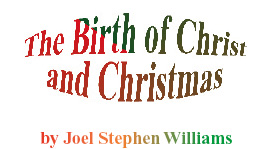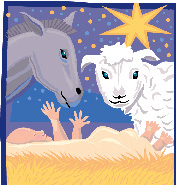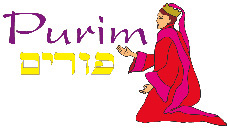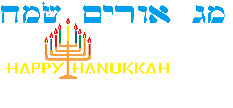

 If the only thing we do at Christmas time is either say
absolutely nothing about the birth of Christ, or we constantly lecture
people that we do not know when Jesus was born, we end up teaching a
negative message about Christmas. The impression some people get
is: "They do not believe in the birth of Jesus." While
reminding people that we are not commanded to set aside a special day
to honor the birth of Jesus, although there is nothing wrong with
remembering his birth at any time (Romans 14:4-6),
the message some people hear is that we are opposed to the birth of
Jesus in some manner. Our intentions may be good, but what we
achieve, at times, is counterproductive.
If the only thing we do at Christmas time is either say
absolutely nothing about the birth of Christ, or we constantly lecture
people that we do not know when Jesus was born, we end up teaching a
negative message about Christmas. The impression some people get
is: "They do not believe in the birth of Jesus." While
reminding people that we are not commanded to set aside a special day
to honor the birth of Jesus, although there is nothing wrong with
remembering his birth at any time (Romans 14:4-6),
the message some people hear is that we are opposed to the birth of
Jesus in some manner. Our intentions may be good, but what we
achieve, at times, is counterproductive.
Is there anything wrong with setting aside a special time to center our thoughts on the birth of Jesus? Granted, we are not specifically commanded to do this. However, is it wrong to think about, sing about, and teach about Jesus' birth at any time of the year? Must we only do it in July because others tend to do it in December? One veteran gospel preacher used to respond to this sort of thinking with a touch of sarcasm. He would say, "The Episcopalians down the street use their front door to go in and out of their church building. I guess we need to use the windows."
 A useful parallel to our situation
is found in the celebration of two festivals by the Jewish people,
festivals which were not commanded by God anywhere in the Old
Testament. One is the Feast of Purim which celebrated the
deliverance of the Jewish people as recounted in the book of
Esther. The second is the Feast of Dedication, or Hanukkah, at
which Jesus was present (John
10:22), which originated during the days
A useful parallel to our situation
is found in the celebration of two festivals by the Jewish people,
festivals which were not commanded by God anywhere in the Old
Testament. One is the Feast of Purim which celebrated the
deliverance of the Jewish people as recounted in the book of
Esther. The second is the Feast of Dedication, or Hanukkah, at
which Jesus was present (John
10:22), which originated during the days  between
the Old Testament and the New Testament and
celebrated the cleansing of their temple. As Daniel Rouse
suggests: "If God's people chose to spontaneously celebrate the
cleansing of their temple and their deliverance as a people, could not
God's people today similarly celebrate the birth of the Savior and his
resurrection from the dead?"
between
the Old Testament and the New Testament and
celebrated the cleansing of their temple. As Daniel Rouse
suggests: "If God's people chose to spontaneously celebrate the
cleansing of their temple and their deliverance as a people, could not
God's people today similarly celebrate the birth of the Savior and his
resurrection from the dead?"
While we do not know when the Nativity happened, late December is a good time to draw attention to the birth of Jesus. Others around us are doing the same, so our teaching emphasis will provide good reinforcement for the precious truth of God's incarnation.
Back to Contents Does God Exist?, NovDec08.